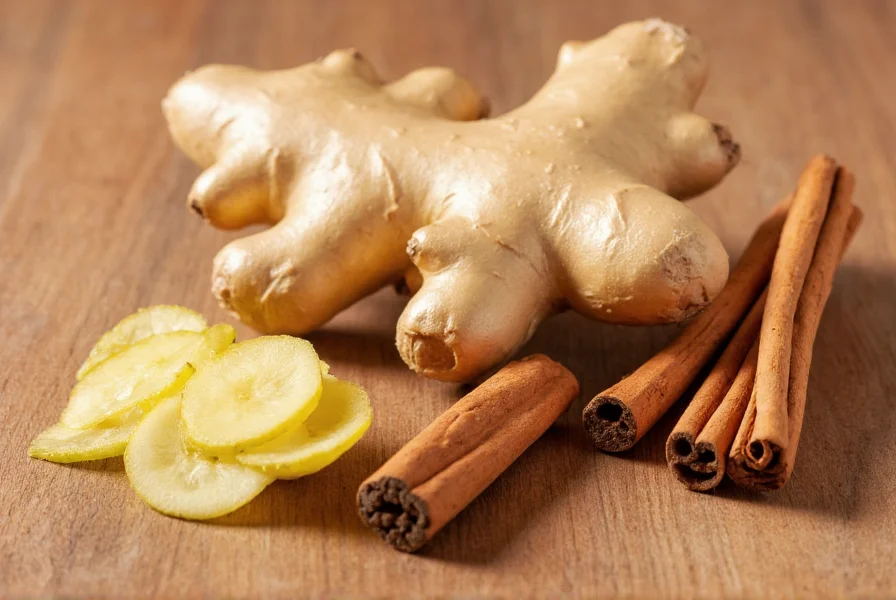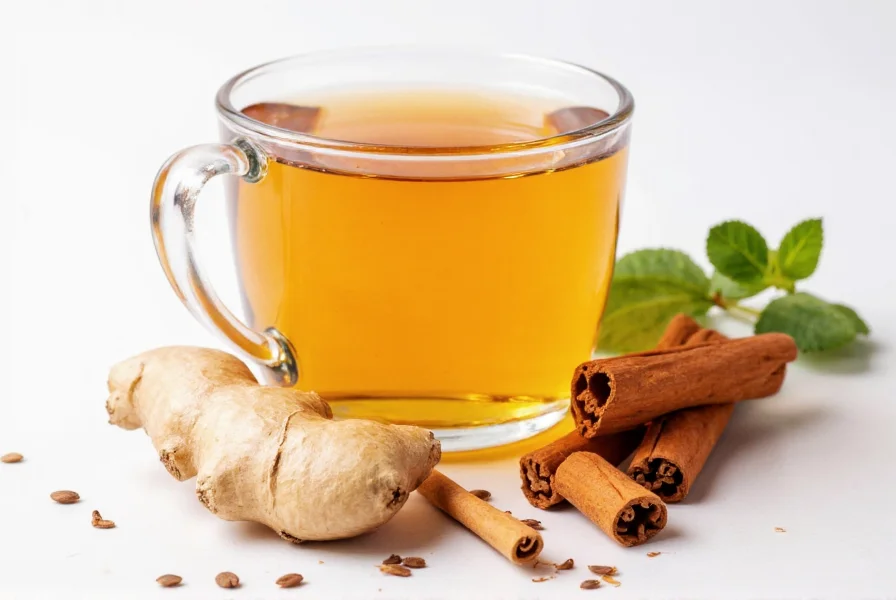The Science Behind Ginger and Cinnamon Tea Benefits
When combined in tea form, ginger and cinnamon create a powerful natural remedy with multiple health advantages. Research shows these spices contain bioactive compounds that work together to enhance their individual effects. Gingerol in ginger and cinnamaldehyde in cinnamon are the primary active components responsible for most therapeutic benefits.

Top 5 Evidence-Based Health Benefits
Multiple clinical studies have documented specific advantages of regular ginger and cinnamon tea consumption. These aren't just traditional remedies without scientific backing—modern research continues to validate many of these health claims.
| Benefit | Scientific Evidence | Recommended Consumption |
|---|---|---|
| Improved Digestion | Multiple studies show ginger reduces nausea and speeds gastric emptying | 1 cup before meals or when experiencing discomfort |
| Blood Sugar Regulation | Cinnamon improves insulin sensitivity in multiple clinical trials | 1 cup between meals, particularly after carbohydrate-rich foods |
| Anti-Inflammatory Effects | Both spices reduce inflammatory markers like CRP in human studies | 1-2 cups daily for chronic inflammation management |
Digestive Health Improvements
Ginger and cinnamon tea benefits for digestion represent one of the most well-documented advantages. Ginger contains gingerols that accelerate gastric emptying and reduce nausea, making it particularly valuable for morning sickness, motion sickness, and postoperative nausea. A 2022 meta-analysis published in the Journal of Gastroenterology confirmed ginger's effectiveness for functional dyspepsia. Cinnamon complements this by reducing intestinal spasms and bloating. For optimal digestive support, consume your ginger cinnamon tea for digestion about 20 minutes before meals.
Blood Sugar Management Properties
One of the most significant cinnamon tea benefits for blood sugar comes from cinnamon's ability to mimic insulin and improve insulin sensitivity. Research in the American Journal of Clinical Nutrition found that consuming just 1-6 grams of cinnamon daily reduced fasting blood glucose by 10-29% in people with type 2 diabetes. When combined with ginger—which also shows promise for improving carbohydrate metabolism—the effect becomes even more pronounced. This makes ginger and cinnamon tea for blood sugar control a valuable addition to diabetes management protocols, though it should never replace prescribed medications.
Natural Preparation Methods
Creating effective ginger cinnamon tea requires proper preparation to maximize the extraction of beneficial compounds. The traditional method involves:
- Slicing 1-inch fresh ginger root (peeled)
- Adding 1-2 cinnamon sticks or ½ teaspoon ground cinnamon
- Simmering in 2 cups water for 10-15 minutes
- Straining and optionally adding lemon or honey
For enhanced ginger cinnamon tea benefits for weight loss, some researchers recommend adding a slice of lemon for additional polyphenols. The simmering process is crucial—boiling destroys some delicate compounds while insufficient heating fails to extract maximum benefits.

Safety Considerations and Potential Side Effects
While generally safe, ginger and cinnamon tea side effects can occur with excessive consumption. Ginger may interact with blood thinners, and cinnamon—particularly Cassia variety—contains coumarin which can cause liver issues in high doses. The European Food Safety Authority recommends limiting coumarin intake to 0.1 mg per kg of body weight daily. For most adults, this means consuming no more than 2-3 cups of strong cinnamon tea daily. Those with gallstone issues should consult a physician before regular consumption, as ginger may increase bile production.
Optimal Consumption Timing and Frequency
Understanding when to drink ginger cinnamon tea significantly impacts its effectiveness. Morning consumption supports metabolism and provides natural energy without caffeine. Before meals enhances digestive benefits, while evening consumption may improve sleep quality through reduced inflammation. For ginger cinnamon tea for weight loss specifically, drinking 20-30 minutes before meals may help with appetite control. Most research suggests consistent daily consumption yields better results than sporadic use, with optimal benefits appearing after 4-8 weeks of regular intake.
Comparative Benefits Against Other Herbal Teas
When evaluating natural remedies with ginger and cinnamon, this combination offers unique advantages over single-ingredient teas. Unlike chamomile (primarily for relaxation) or peppermint (mainly for digestion), ginger and cinnamon tea delivers multiple simultaneous benefits. It provides stronger anti-inflammatory effects than most single herbal teas while offering more comprehensive metabolic support than green tea alone. The scientific evidence for ginger tea benefits combined with cinnamon's properties creates a broader spectrum of health advantages compared to many other popular herbal infusions.
Conclusion: Maximizing Your Tea Experience
Ginger and cinnamon tea represents a time-tested natural remedy with growing scientific validation. By understanding the specific ginger and cinnamon tea benefits and preparing it correctly, you can harness these spices' full potential. Remember that while this tea offers numerous advantages, it works best as part of a comprehensive healthy lifestyle rather than a standalone solution. Consistent, moderate consumption yields the most significant results without risking potential side effects.
Frequently Asked Questions
How often should I drink ginger and cinnamon tea for optimal benefits?
For most health benefits, consuming 1-2 cups daily provides optimal results. Research suggests consistency matters more than quantity—daily consumption for 4-8 weeks shows better outcomes than occasional heavy consumption. Those using ginger cinnamon tea for blood sugar control may benefit from drinking it between meals, while those seeking digestive support should consume it 20 minutes before eating.
Can ginger and cinnamon tea help with weight loss?
While not a magic solution, ginger and cinnamon tea for weight loss can support metabolism and appetite control. Studies show cinnamon improves insulin sensitivity which helps regulate fat storage, while ginger increases thermogenesis. When combined with a healthy diet and exercise, regular consumption may contribute to modest weight loss—typically 2-5 pounds over 8-12 weeks in clinical trials. It works best as part of a comprehensive weight management plan.
What's the difference between using fresh ginger versus powdered ginger?
Fresh ginger contains higher concentrations of gingerols—the compounds responsible for most health benefits. Studies show fresh ginger has approximately 30% more active compounds than dried powder. However, powdered ginger offers convenience and more consistent dosing. For maximum ginger and cinnamon tea benefits, use freshly grated ginger simmered for 10-15 minutes. If using powder, ¼ teaspoon provides similar benefits to one inch of fresh root.
Are there specific times of day when ginger and cinnamon tea is most effective?
Timing affects which ginger and cinnamon tea benefits you'll experience most prominently. Morning consumption supports metabolism and provides natural energy. Before meals enhances digestive benefits and may reduce appetite. Evening consumption can improve sleep quality through reduced inflammation. For blood sugar management, between-meal consumption works best. Avoid drinking it too close to bedtime if you're sensitive to ginger's mild stimulating effects.











 浙公网安备
33010002000092号
浙公网安备
33010002000092号 浙B2-20120091-4
浙B2-20120091-4